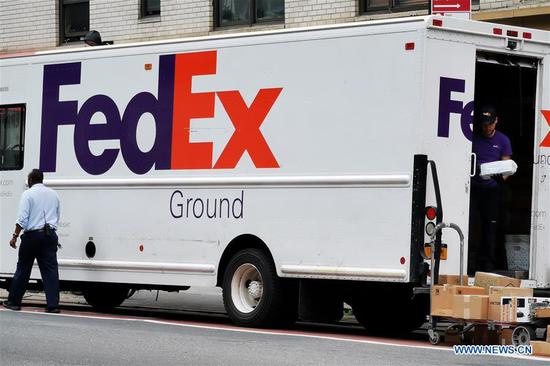
A FedEx delivery truck is pictured in Manhattan, New York, the United States, June 25, 2019. U.S. courier delivery company FedEx Corp. on Monday sued the U.S. Department of Commerce over a request that the package giant enforce restrictions on Chinese telecom equipment provider Huawei. (Xinhua/Li Muzi)
Washington's agenda damages American companies: expert
FedEx filed a lawsuit against the U.S. Commerce Department on Monday (U.S. time) over rules on export, which experts said showed the U.S. government's exercise of "long-arm jurisdiction" on global cooperation would harm and cause chaos to American companies and the market.
They also noted that the U.S. entity list served Washington's agenda of crushing foreign companies and is totally against the market spirit.
The U.S. courier failed to ship a Huawei phone to the U.S. from the UK last week. On Monday, when China's Ministry of Foreign Affairs demanded an explanation from FedEx, it said the U.S. government is the "real cause of confusion."
The FedEx lawsuit against the U.S. government came from its inability to police hundreds of thousands of shipments for regulatory violations, said its CEO and chairman Fred Smith, according to media reports on Tuesday.
FedEx said in a statement sent to the Global Times on Tuesday that the lawsuit goes against the Export Administration Regulations (EAR), which FedEx said "violates common carriers' rights" and poses "impossible burdens on common carriers like FedEx."
"FedEx is a transportation company, not a law enforcement agency," it said.
Although FedEx filed the lawsuit against the EAR, it also stated the company "strongly supports the objectives of U.S. export control laws."
It was not the first time that FedEx mishandled packages related to Huawei. In May, FedEx rerouted Huawei's packages to its offices in Asia and shipped them to the delivery company's headquarters in the U.S..
The lawsuit shows the U.S. firm's strong desire to repair its damaged reputation with Chinese consumers and other global clients and also reflects the deterrent ability of Chinese laws and regulations, Mei Xinyu, an analyst close to the Ministry of Commerce, told the Global Times on Tuesday.
U.S. carrier companies such as FedEx are now caught between a rock and a hard place, experts said, noting that on one hand, as a U.S. company, they are obliged to obey U.S. regulations, but on the other hand, obeying U.S. regulations could ruin their business reputation with global clients.
The lawsuit will not help the U.S. delivery service provider escape punishment from China, Mei said, noting that many industry insiders predict that FedEx could possibly be the first U.S. firm to be added on China's unreliable entity list.
"If so, it is not China that FedEx should blame, but the U.S.," he told the Global Times.
Unreasonable regulations
The FedEx lawsuit showed the U.S. government's exercise of "long-arm jurisdiction" through the EAR to do whatever it wants to regulate foreign companies, which harms normal business cooperation and would also cause chaos among U.S. companies and its market, experts noted.
The U.S. EAR is a law enacted by the country to manage companies when they export high-tech products, said Li Min, a senior partner with Shanghai Hansheng Law Offices.
The EAR has very broad application. According to Li, if companies that are somewhat related to the U.S., do business with companies on the entity list, Washington could punish them.
Experts said that the regulations set "general and vague" standards for companies, which are unreasonable, as U.S. firms may not clearly know what kind of business behavior with Chinese companies could violate related regulations.
Given the vagueness of this regulation, it could be exploited by the U.S. government, experts said, noting that in order to avoid damage to their interests, U.S. firms like FedEx would have no choice but to follow it.
Li noted that Huawei is such a case as the U.S. made use of judicial intervention to interrupt normal business activities between the Chinese tech giant and American firms.
The U.S. put Huawei and 70 of its affiliates on an entity list in May.
Five Chinese supercomputing companies and institutes were also recently barred from access to American technology over so-called national security concerns, as they were added to the entity list on Friday.
On May 22, the U.S. government said it considered banning five Chinese video surveillance firms, including Hikvision, from buying U.S. technology
"The EAR is intended to serve the U.S. agenda of crushing foreign companies and is totally against the market spirit," Song Guoyou, director of Fudan University's Center for Economic Diplomacy, told the Global Times on Tuesday.
"FedEx's case shows that the politically-charged agenda is harming everyone's interest, including the interest of American companies," Song said.
"The U.S. government would reconsider the EAR if all the affected companies decide to fight back," Song told the Global Times.


















































